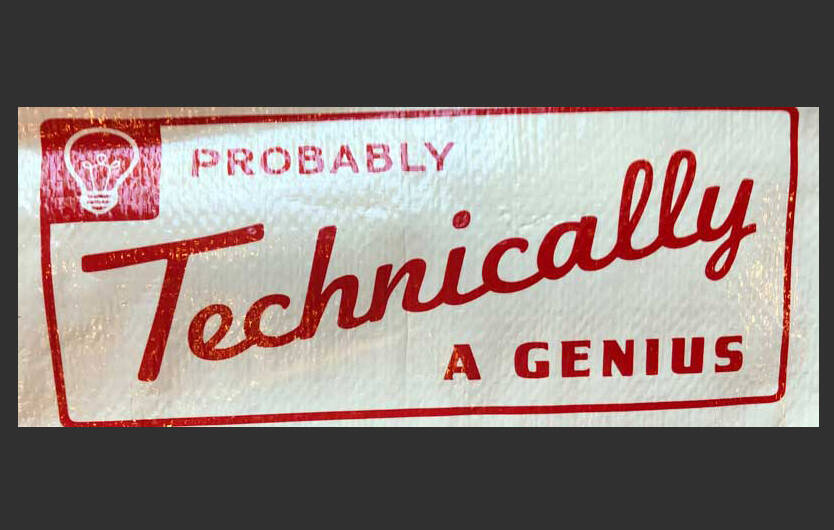By Morf Morford, Tacoma Daily Index
Would you be comfortable with a 16% failure rate? According to a recent book (Anatomy of a Breakthrough: How to Get Unstuck When It Matters Most by Adam Alter, Copyright © 2023 by Adam Alter, Simon & Schuster, Inc.), a 16% failure rate was good enough for Einstein and Mozart – and a host of others renowned for their productivity.
Writer’s block?
Writer’s block is when a writer has nothing to write. Just about every writer suffers from writer’s block. Or at least that’s what most of us have heard. I’m not sure I believe it though.
I never have writer’s block. When I don’t have anything to write, I don’t write.
To me, it’s sort of like asking what you eat when you are not hungry. Why would I eat anything?
Why would I (or anyone) write when I don’t have anything to say? Or ask? Or wonder about?
Is everything I write good? Or even worth saving? Probably not.
Entrepreneur’s block
According to this book, about 85% of almost anything is good, or at least worth keeping – or, as in the case of Einstein and Mozart (and many others), astounding if not memorable, even, as in the case of Mozart, after a few centuries have passed.
For all of us, whether we are writers or artists or parents or anything else, it is our refusal to make a mistake that restricts our ability to learn anything new.
As one writer put it recently, the “perfect” is not only the enemy of the good – it is the enemy of everything.
No matter what you try, from making an omelet to ice-skating to playing a musical instrument, you won’t do it exactly right the first time. Or the second time. Or even the third. But once you get it right, you’ll never forget it. And that skill becomes a part of who we are and prepares the way for the next step – however uncertain, even clumsy that might be.
Failing on the way to success
As I was working on this article I attended a “celebration of life” of a family member who died at the age of 52. He owned his own airplane, was a pilot, scuba diver, mountain climber (and teacher of technical climbing), had a photography studio, started a restaurant and ran a high tech start-up company. And designed and built his own house.
And probably a few other things.
When asked how he did so much, his answer was very simple; he assumed he would fail at first until he mastered anything. In other words, he wasn’t afraid to fail. Or look foolish. Playing it safe, he learned, was not the way to success.
Failure and invention are inseparable twins -Jeff Bezos
And I would venture to say that that philosophy is the surest route to mastery and success in any field. After all, if you are afraid of failure, you will never learn and make any steps toward success.
To put it another way, failure is the best teacher – and the more spectacularly you fail, the less likely that you will ever forget what you need to learn to get it right the next time.
After all, to put it directly, if you are not failing, you are not doing anything new. And you are not learning anything new. And learning, by definition, is incorporating new information with what you already know.
Abraham Lincoln
Abraham Lincoln is, by most accounts, America’s most respected president. His “failures” are the stuff of popular culture. Most are slight, if not hyperbolic, exaggerations. I would argue that most of us respect Lincoln precisely because of the difficulties and obstacles he faced and largely surmounted. You can see a detailed analysis of Lincoln’s life here.
The bottom line is that the number or percentage of failure doesn’t really matter. What matters is the determination to get past them and into mastery and some definition of success. As politicians (and musicians and actors) know, it only takes one breakthrough to define (and create) a career – and a reputation.
Fail proudly
Oddly enough, messing up and then recovering from mistakes and disasters draws people closer to us and makes us more human and more relatable. The perception of unblemished perfection creates distance and an unattractive, even an antiseptic or artificial sense of not being approachable.
Denying a mistake – or even worse, blaming others – just convinces others that you imagine yourself perfect and refuse to learn from your mistakes.
Doing anything not-right is the only way to learn to do anything right. Consider driving a car, or cooking, or actually anything worth doing – we learn by doing. And by doing it wrong.
Claim victory when you can
If you want to see the ultimate look of triumph, observe a toddler learning to walk. They will never quit. It literally doesn’t matter how many times they fail, or how many bruises they acquire. They will master walking upright no matter how high the cost. Every potential entrepreneur could learn a lot from a toddler.
Over-night success never is
As every musician and actor knows all too well, it can take years of under-paid, exhausting work to finally become the “over-night success” of pop culture fame. And “one-hit wonders” are all too common. And so are those who quit just short of success. In short, as the well-known historian Arnold Toynbee put it, nothing fails like success.
Nothing is more lethal to the creative process or a company’s survival than getting too comfortable. Complacency has been the cause of business failure far more than any other external financial cause. In short, most of even the most creative and talented people can expect to fail at least once for every five or six attempts. But once we make that breakthrough, the mess-ups don’t even matter.






